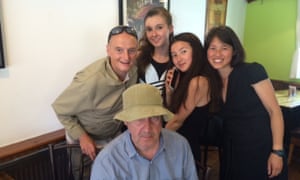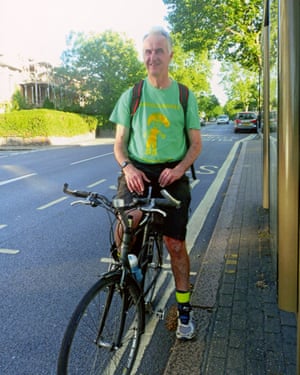The death certificate said heart attack. But anyone familiar with what my brother had been through over the last decade of his life knew the real cause of death: depression. A self-depleting torment that knew no rock bottom; a psychological tumour that consumed his personality.
Now, looking back after several months on an end that Stephen had said was all he prayed for, I think there was something missing on the certificate: not a cause of death, but a “cause of hope”. That cause was a procedure once derided as the Frankenstein treatment: ECT, or electroconvulsive therapy. Last week it was reported that ECT is on the rise again, with more than 22,000 individual treatments carried out in England in 2015-16.
For some people, this new research will have reawoken old fears of the therapy, and it has certainly brought forth a welter of images of Randle McMurphy, Jack Nicholson’s character in One Flew Over the Cuckoo’s Nest, who was laid impossibly low by the treatment. It’s a context in which my brother’s story needs to be heard.
My brother’s case of depression may well have been “severe”, or “psychotic” or “neurochemical”, or any of the labels used in the struggle to understand his condition. But for me the definitive label was “treatment-resistant”.
Antidepressants, tranqs, sleepers, hypnotics, anxiety meds, CBT, visualisation strategies, talking therapies – my brother, bless him, tried every regime, and stuck to them doggedly even as his symptoms escalated. The efforts of the NHS doctors to find the magic formula, the right balance of millilitres and microgrammes, could not be faulted.

With every regimen change there would be new flickerings of hope. Patience, the psychiatrists always cautioned – there is never a quick fix. If these drugs do work, it might be weeks, months, before the first inkling. But the lesson of the passing years was that the drugs didn’t work. The darkness engulfing Stephen became a tomb. And it engulfed us all – his wife, his daughters, his brothers, his parents.
So it seemed little short of a miracle when a “last resort” treatment penetrated that malign murk – indeed, blew it away. According to data collected by the Guardian, about 2,000 patients were given ECT in 2011. Thank God Stephen was one of them. A life that had been little more than an extended stupor, enlivened only by the gobbling of stodge, was transformed. The principled, generous, engaged soul re-emerged, as if from hibernation.
The addiction to discomfort eating, which brought only self-hatred, was ousted by a renewed passion for cycling. The old Stephen was reborn. As the writer and professor of clinical psychology Andrew Solomon has sagely noted, the opposite of depression is not happiness, but vitality.
My brother ended up getting four amazing, unexpected years of vitality: not a bad result from a seizure lasting less than a minute, triggered by an electrical current applied for up to eight seconds. All under general anaesthetic. No thrashing, no writhing. Perhaps a little toe-curling.
So if there is anything “crude and controversial” about ECT it’s the reaction, from some corners, to the revelation that these treatments are on the rise again. The portrayals that put this procedure on a par with lobotomy belong to a wholly different mental health era. We all know what happened to McMurphy at the hands of Nurse Ratched, but that was a fictional depiction, decades ago. When the Ramones sang Gimme Gimme Shock Treatment they made it sound like something only the truly twisted would consider. The experiences of Sylvia Plath – who described ECT as “a great jolt [that] drubbed me till I thought my bones would break and the sap fly out of me like a split plant” – or Janet Frame, the New Zealand poet incarcerated in asylums and subjected to 200 treatments by sadistic nurses, are brutal. But if anything they demonstrate how far mental healthcare has come.

Last week the mental health charity Mind warned that the side-effects of ECT could include memory loss, difficulty concentrating and dizziness. In my brother’s case, these were the side-effects of not having ECT. But I still suspect that the ultimate side-effect of not having the procedure was his death last October.
The procedure had given him four precious years of vitality. In the middle of a cycle ride from Land’s End to John O’Groats – to raise money for the Maudsley hospital, in south London, where his treatment was carried out – his illness returned. The doctors knew – we all knew – that his best chance, perhaps his only chance, was another ECT course. But good medical practice meant that first they had to go through the rigmarole of drug regimes they knew would probably fail.
ECT time came agonisingly closer. His depression raged out of control – worse he said, than ever. And on top of this, even grimmer news: a persistent tremor was incipient Parkinson’s. The catastrophic thinking that was the hallmark of his depression now played a terminal role: the ECT miracle, those four years of vitality? A fluke, a trick, a story. Go under general anaesthetic? What happens if it leaves me conscious but paralysed? And anyway, what’s the point in being liberated from depression into a life ravaged by Parkinson’s?
The years of vitality were not to be repeated. But without ECT they would not have happened. At his funeral one of his fellow cyclists gave an oration. “Steve Mayers, what a guy. Steve Mayers, what a guy. Steve Mayers what a guy,” he intoned in broad Wolverhampton.
At the same time pictures flashed up on a big screen of Stephen on a bike. Forget Jack Nicholson, I thought. My big brother’s the positive face of ECT.
Drugs didn’t work for my brother. Electroconvulsive therapy did | Andrew Mayers
Hiç yorum yok:
Yorum Gönder